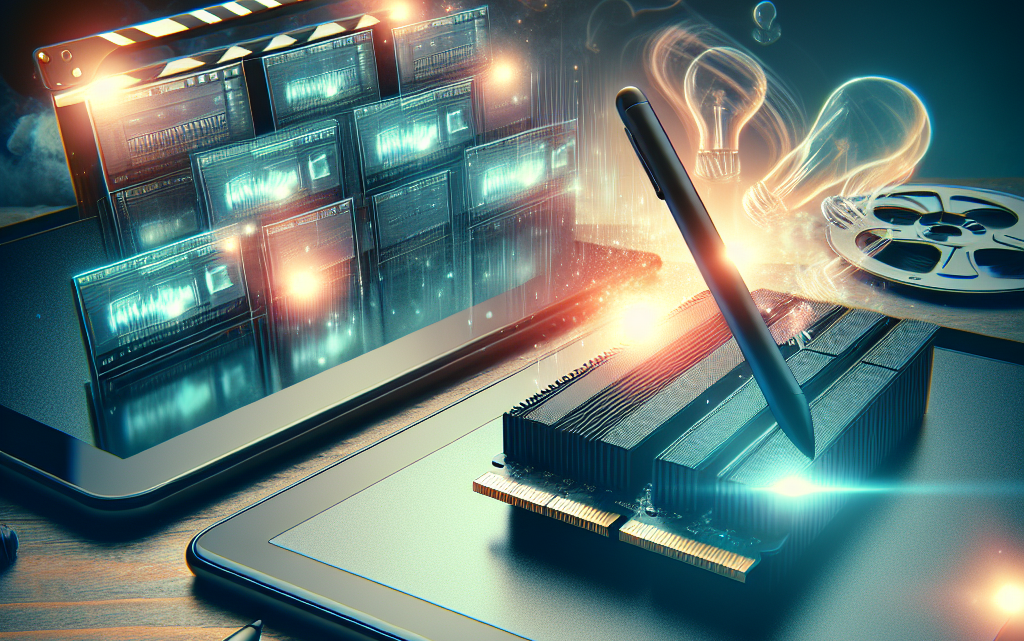Tablets have become invaluable tools for various purposes, ranging from casual browsing to professional work. However, when it comes to specialized tasks like video editing, tablets optimized for this purpose stand out significantly from standard models. This article delves into the specifics of how video editing tablets differ in terms of hardware and software features compared to regular tablets.
Processor and Graphics Performance
The processor, often referred to as the ‘brain’ of the tablet, plays a crucial role in video editing. Tablets dedicated to video editing are equipped with more powerful processors and advanced graphics capabilities to handle the intensive computational requirements of video editing software.
| Feature | Video Editing Tablets | Standard Tablets |
|---|---|---|
| Processor | High-performance multi-core processors (e.g., A12Z Bionic, Snapdragon 8cx) | Mid-range processors (e.g., A12 Bionic, Snapdragon 660) |
| Graphics | Integrated advanced graphics units (e.g., Apple GPU, Adreno 690) | Basic integrated graphics units (e.g., PowerVR, Adreno 512) |
RAM and Storage
RAM and storage are pivotal in video editing, as these elements affect the tablet’s ability to handle large files and run editing applications smoothly. Video editing tablets generally come with higher RAM and more storage options to accommodate extensive media libraries and resource-heavy editing software.
| Feature | Video Editing Tablets | Standard Tablets |
|---|---|---|
| RAM | 8GB to 16GB | 2GB to 6GB |
| Storage | 256GB to 1TB, often with expandable storage options | 32GB to 128GB, limited expandable storage |
Display Quality
High display quality is essential for precise video editing, as it affects the color accuracy and resolution when viewing footage. Tablets optimized for video editing usually come with superior display specifications.
| Feature | Video Editing Tablets | Standard Tablets |
|---|---|---|
| Resolution | 2K to 4K displays | Full HD (1080p) displays |
| Color Accuracy | Wide color gamut (P3) and HDR support | sRGB, standard dynamic range |
| Screen Size | 10 to 13 inches | 7 to 10 inches |
Software and Compatibility
Software compatibility and the availability of high-quality video editing applications are essential for video editors. Tablets optimized for video editing often support professional-grade software and tools.
| Feature | Video Editing Tablets | Standard Tablets |
|---|---|---|
| Software Support | Professional software (e.g., Adobe Premiere Rush, Final Cut Pro) | Basic editing apps (e.g., iMovie, Android video editors) |
| Accessory Compatibility | Styli with pressure sensitivity, external SSDs, keyboard attachments | Limited accessory support |
Battery Life and Durability
Battery life and durability are also crucial aspects, especially for on-the-go video editing. High-performance tablets need to maintain a balance between power consumption and battery longevity.
| Feature | Video Editing Tablets | Standard Tablets |
|---|---|---|
| Battery Life | 8 to 12 hours under heavy use | 8 to 12 hours under moderate use |
| Build Quality | Premium materials with robust build | Standard materials |
User Experience and Additional Features
Lastly, the overall user experience and additional features play a significant role in differentiating video editing tablets from standard models. These include user interface, multi-tasking capabilities, and specialized input devices.
| Feature | Video Editing Tablets | Standard Tablets |
|---|---|---|
| User Interface | Optimized for touch and stylus input | Basic touch interface |
| Multi-tasking | Advanced multi-tasking capabilities | Basic multi-tasking |
| Specialized Inputs | Stylus with high pressure sensitivity and precision | Basic stylus support |
Conclusion
In summary, tablets optimized for video editing boast superior specifications across various facets, including processing power, RAM, storage, display quality, software compatibility, battery life, and user experience. These enhancements make them ideal for professionals and enthusiasts who require robust devices to handle demanding video editing tasks efficiently.

